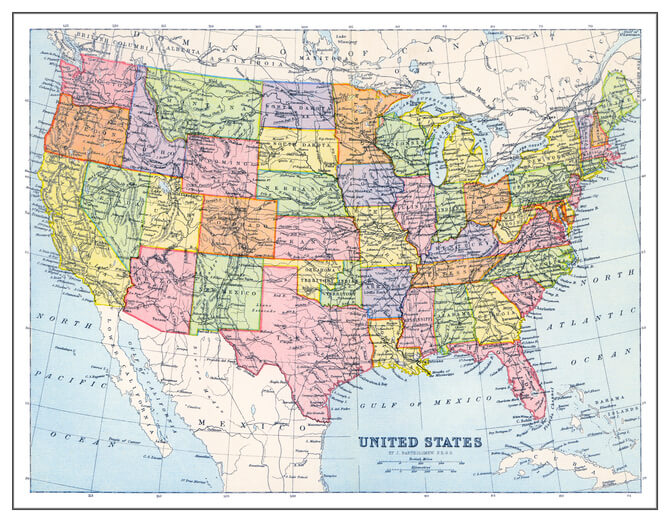Tax season can be difficult for a lot of nonresidents who move to the US.
With so many different aspects of taxes in the US, it can be easy to feel a little overwhelmed.
Filing both state taxes and federal taxes are vitally important to ensure your nonresident state income tax withholding is correct.
Nonresident state tax returns are one of the lesser-known areas of tax for many people, so in this blog post we’ll outline everything you need to know about them as well as how to file them.
So, without further ado, let’s dive right in!
What is a nonresident state tax return?
Some states in the US may require you to file a nonresident state tax return.
As well as that, nonresident filing requirements by state will have different characteristics and requirements.
In some cases, you may have to file a nonresident state tax return if you’ve received income in a state where you don’t live, as well as a federal and tax return with your home state.
There are eight states in the US that don’t charge state income tax:
- Wyoming
- Washington
- Texas
- Tennessee
- South Dakota
- Nevada
- Florida
- Alaska
Most US states have taxation agreements meaning that if you lived and worked in one state, you will not be taxed twice on the same income, as long as you file state taxes in each.
How is state residency determined
Well, that depends!
Each state has different rules that determine the residency of the individual.
In some cases, in order to be considered a full-year resident of any particular state you must be domiciled there and you must have also spent at least six months living there.
However, if you received income from another state and did not live there for any part of the year, you will be considered a nonresident for tax purposes in that state.
Find out all about working in multiple states here.
Moved to a different state during the tax year?
You may also be considered a part-year resident of that state. This, however, depends on the state, as some will judge length of stay, purpose of visiting the other state, intention to establish domicile in the new state, and more.
However, a lot of states have different rules when it comes to taxing.
Some states adhere to federal-level tax rules.
That means, for example, that if you are seen as a nonresident for tax purposes at federal level, then you will be considered a nonresident for tax purposes at state level too.

Do I have to file a nonresident state tax return?
If you have tax filing requirements, you will need to file a nonresident state tax return.
Each state’s requirements differ.
In the majority of cases, you will have tax filing obligations if you earned income within that state.
Here is a complete state-by-state guide to nonresident state taxes in the US!
Tax forms for correct tax withholding
States are independent from one another in their taxing authority, and all state tax forms differ in some respects.
In other words, the type of document you must file – as well as the deadline to file – differs from state to state.
For example, in New York all nonresidents with a tax filing requirement should file a form ‘IT-203’. Meanwhile, in California all nonresidents with a tax filing requirement should file a form ‘540NR’, as well as their federal tax return.
When can I file my nonresident state tax return?
Well, the federal tax deadline in 2025 is 15 April (this can change year-on-year depending on what day 15 April falls on).
However, when it comes to state tax deadlines, it once again depends on your state.
A lot of states will have their tax deadline in line with the federal deadline.

Some US states have reciprocity agreements
Some US states have what are known as ‘reciprocity agreements’ that are in place to reduce the amount of tax a person will pay.
If two states have an agreement, then the worker will only pay tax in the state in which they are considered residents.
If you are in a state that doesn’t have a reciprocal tax agreement in place with the state you work in, your taxes will be withheld in the state you work in.
You will also have to file taxes in both states to figure out how much you will be refunded from either.
Can I file federal taxes before state?
At tax time, you are expected to file both a federal and state tax return (if you have tax filing requirements), and they are usually filed simultaneously.
That is because you will need information from your federal return to file a state tax return.
Some people choose to file state tax returns first to use their refund to offset any tax owed at a federal level. However, this is not recommended as it can take some time to received the state tax refund.
However, if you wish to e-file your tax returns, you will need to file your federal tax return first.
I accidentally filed taxes in the wrong state. What should I do?
Filing out of state taxes is a pretty common occurrence. So first things first – don’t worry!
Again, each state has a unique form that you will need to file to amend your state tax return – California uses Schedule X, for example.
You will need to attach the amended state tax return to your state tax return.
How to file a nonresident state tax return with Sprintax
Each year, Sprintax helps hundreds of thousands of nonresidents with their taxes – safe to say we know a thing or two about tax!
We can automatically generate state tax returns, on top of federal documents and more!
You will also get your maximum US tax refund guaranteed – our average state tax refund is $462.
Get started with your nonresident state tax return here!








